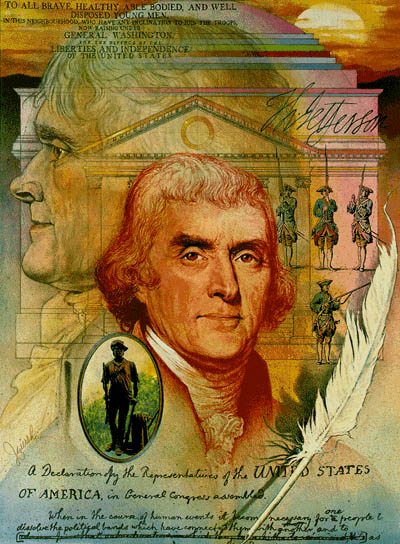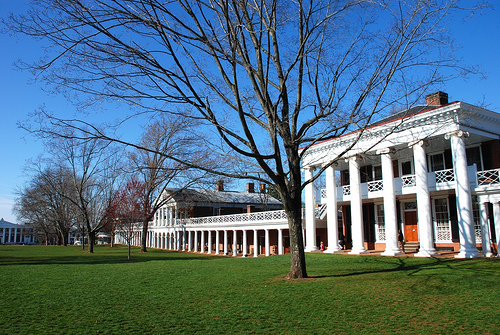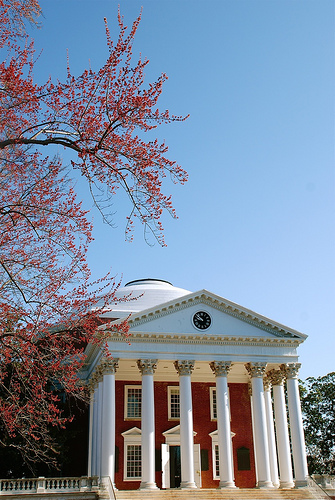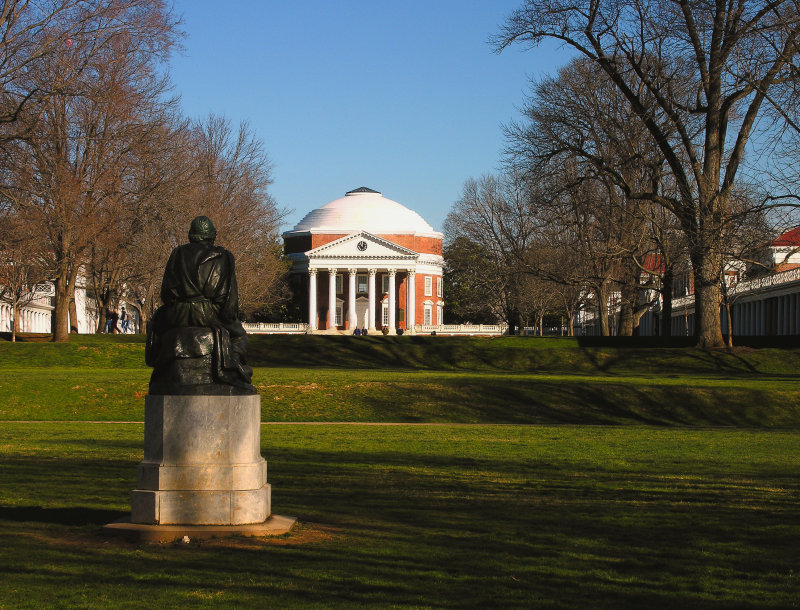Can We Party like it's 1776 and Just Start Over? Thomas Jefferson's Top 10 Quotes on Money and Banking

Jefferson's most magnificent creation - The Rotunda at UVa in Charlottesville.
Full Disclosure: Your author is a graduate of the University of Virginia.
Here's some quick history on Jefferson:
--
Uncanny how little has changed about banksters in 200 years...
Thomas Jefferson's Top 10 Quotes On Money And Banking
"If the American people ever allow private banks to control the issue of their currency, first by inflation, then by deflation, the banks and corporations that will grow up around [the banks] will deprive the people of all property until their children wake-up homeless on the continent their fathers conquered. The issuing power should be taken from the banks and restored to the people, to whom it properly belongs."
"I sincerely believe that banking establishments are more dangerous than standing armies, and that the principle of spending money to be paid by posterity under the name of funding is but swindling futurity on a large scale." --Thomas Jefferson to John Taylor, 1816.
"Everything predicted by the enemies of banks, in the beginning, is now coming to pass. We are to be ruined now by the deluge of bank paper. It is cruel that such revolutions in private fortunes should be at the mercy of avaricious adventurers, who, instead of employing their capital, if any they have, in manufactures, commerce, and other useful pursuits, make it an instrument to burden all the interchanges of property with their swindling profits, profits which are the price of no useful industry of theirs." --Thomas Jefferson to Thomas Cooper, 1814.
"The art and mystery of banks... is established on the principle that 'private debts are a public blessing.' That the evidences of those private debts, called bank notes, become active capital, and aliment the whole commerce, manufactures, and agriculture of the United States. Here are a set of people, for instance, who have bestowed on us the great blessing of running in our debt about two hundred millions of dollars, without our knowing who they are, where they are, or what property they have to pay this debt when called on."
"The treasury, lacking confidence in the country, delivered itself bound hand and foot to bold and bankrupt adventurers and bankers pretending to have money, whom it could have crushed at any moment…These jugglers were at the feet of government. For it was not, any confidence in their frothy bubbles, but the lack of all other money, which induced…people to take their paper" -- Thomas Jefferson, October 1815 letter to (former) Treasury Secretary, Albert Gallatin.
"I own it to be my opinion, that good will arise from the destruction of our credit. I see nothing else which can restrain our disposition to luxury, and to the change of those manners which alone can preserve republican government. As it is impossible to prevent credit, the best way would be to cure its ill effects by giving an instantaneous recovery to the creditor. This would be reducing purchases on credit to purchases for ready money. A man would then see a prison painted on everything he wished, but had not ready money to pay for." --Thomas Jefferson to Archibald Stuart, 1786.
"If the debt which the banking companies owe be a blessing to anybody, it is to themselves alone, who are realizing a solid interest of eight or ten per cent on it. As to the public, these companies have banished all our gold and silver medium, which, before their institution, we had without interest, which never could have perished in our hands, and would have been our salvation now in the hour of war; instead of which they have given us two hundred million of froth and bubble, on which we are to pay them heavy interest, until it shall vanish into air... We are warranted, then, in affirming that this parody on the principle of 'a public debt being a public blessing,' and its mutation into the blessing of private instead of public debts, is as ridiculous as the original principle itself. In both cases, the truth is, that capital may be produced by industry, and accumulated by economy; but jugglers only will propose to create it by legerdemain tricks with paper." --Thomas Jefferson to John W. Eppes, 1813.
"The Bank of the United States is one of the most deadly hostilities existing, against the principles and form of our Constitution. An institution like this, penetrating by its branches every part of the Union, acting by command and in phalanx, may, in a critical moment, upset the government. I deem no government safe which is under the vassalage of any self-constituted authorities, or any other authority than that of the nation, or its regular functionaries. What an obstruction could not this bank of the United States, with all its branch banks, be in time of war! It might dictate to us the peace we should accept, or withdraw its aids. Ought we then to give further growth to an institution so powerful, so hostile?" --Thomas Jefferson to Albert Gallatin, 1803.
Regulating Banking Institutions
"The principle of rotation... in the body of [bank] directors... breaks in upon the espirit de corps so apt to prevail in permanent bodies; it gives a chance for the public eye penetrating into the sanctuary of those proceedings and practices, which the avarice of the directors may introduce for their personal emolument, and which the resentments of excluded directors, or the honesty of those duly admitted, might betray to the public; and it gives an opportunity at the end of the year, or at other periods, of correcting a choice, which on trial, proves to have been unfortunate." --Thomas Jefferson to Albert Gallatin, 1803.
Paper Speculation
"A spirit... of gambling in our public paper has seized on too many of our citizens, and we fear it will check our commerce, arts, manufactures, and agriculture, unless stopped." --Thomas Jefferson to William Carmichael, 1791.
"Our public credit is good, but the abundance of paper has produced a spirit of gambling in the funds, which has laid up our ships at the wharves as too slow instruments of profit, and has even disarmed the hand of the tailor of his needle and thimble. They say the evil will cure itself. I wish it may; but I have rarely seen a gamester cured, even by the disasters of his vocation." --Thomas Jefferson to Gouverneur Morris, 1791.
--
---
Great clips you might not have seen...




 Aug 17, 2011 at 5:06 PM
Aug 17, 2011 at 5:06 PM
Reader Comments (31)
taxpayers vs. bondholders
that simple talking point is making the difference.
The key right there.
nice site
"What kind of society will throw their young to the wolves?"
The answer to this question makes my skin crawl.
@killjoy
"The political clowns of today need to be tossed on their behinds in a people's revolution."
The history of the world tells us that those who overthrow corrupt institutions and come to power eventually become corrupt institutions themselves. Who would you have replace the compromised? It is public awareness and accountability that keep these institutions in check. Look at the tenure of some of our current representatives despite their voting record consistently on behalf of their corporate masters and as personal favors. They fear the corporations more than we the people. Look at the number of private think tanks determining monetary and foreign policy. The days of public pacification and distraction with sex, drugs, and rock n' roll are ending and a day of reckoning will soon be at hand.
Only banks I like...
I like Ernie Banks.
And I like the banks of the Mississippi River.
And I like the banks of Fender twin reverb electric guitar amplifiers behind me!
I ain't too fond of the phone company either!
I find it funny how little has changed. When will we learn our lesson.
http://www.snopes.com/quotes/jefferson/banks.asp
This "quotation" did not ring true, because I was reasonably confident that the word "deflation" was not in use during Jefferson's time, and was not certain that "Inflation" was. Snopes notes that "inflation" might have been in use. There were also very few large corporations in Jefferson's time, and to the best of my knowledge, those that existed were not yet considered a threat to the nation's economic stability and welfare.
Thanks for the link. Very interesting stuff there.
When this information is provided via the media, uninfluenced by corporate or union bias, allowing for real time activism.
Then our elected officials will act as principled statesmen of a proud democracy, not the corrupt minions of the highest payor.
Join Citizens for a Better Broome and grow a better way.
As Jefferson once advised his nephew Peter Carr, "Fix reason firmly in her seat, and call to her tribunal every fact, every opinion. Question with boldness even the existence of a god; because, if there be one, he must more approve the homage of reason than that of blindfolded fear." When Jefferson sought in his draft of the Declaration of Independence to place before "all mankind" the reasons for American independence "in terms so plain and firm as to command their assent," he did not invoke divine law but grounded his philosophy of natural rights in man's nature. To prove his statements, he cited the "Laws of Nature and of Nature's God"—what we would call the laws of science. Such were the metaphysical and epistemological foundations of Jeffersonianism.
Turning to ethics, Jefferson would probably have agreed with Ayn Rand's description of rights as "conditions of existence required by man's nature for his proper survival." He also regarded reason as man's essential attribute; it was reason—or, strictly speaking, the capacity to reason—that provided the basis of natural rights. The three fundamental, "inalienable" rights Jefferson mentioned in the Declaration of Independence—life, liberty, and the pursuit of happiness— really were different ways of expressing the same basic "right," in Rand's sense: recognition that humans are individuals.
In politics, Jefferson was by no means an anarchist, as his enemies alleged. But, far more than his Federalist political opponents (and many modern conservatives), he had confidence in the ability of individuals to govern themselves. The "essence of a republic," he wrote, is a system in which individuals "reserve to themselves personally the exercise of all rightful powers to which they are competent," delegating other powers to their "representatives, chosen immediately, and removable by themselves." Shortly after becoming president, he wrote Joseph Priestley that he envisioned Americans as acting "under the unrestrained and unperverted operation of their own understandings," thus proving to the world "the degree of freedom and self-government in which a society may venture to leave its individual members."
Because government is, as Jefferson stated in the Declaration, "instituted among men" for the express purpose of "securing" natural rights, it was a fundamental principle of Jefferson's political philosophy that no government could legitimately transgress those rights. For law to be binding, it must not only proceed from the will of properly authorized legislators but also be "reasonable, that is, not violative of first principles, natural rights, and the dictates of the sense of justice."
In an 1816 letter, Jefferson observed: "No man has a natural right to commit aggression on the equal rights of another; and this is all from which the laws ought to restrain him; every man is under the natural duty of contributing to the necessities of society; and this is all the laws should enforce on him; and, no man having a natural right to be the judge between himself and another, it is his natural duty to submit to the umpirage of an impartial third." He added, "when the laws have declared and enforced all this, they have fulfilled their functions, and the idea is quite unfounded, that on entering into society we give up any natural right." Two years later, in a report he prepared as chairman of the
Commissioners for the University of Virginia, Jefferson included in his syllabus of the basic principles of government, "a sound spirit of legislation, which, banishing all arbitrary and unnecessary restraint on individual action, shall leave us free to do whatever does not violate the equal rights of another."
Equally fundamental to Jefferson's political philosophy was his constitutionalism. Realizing that "the natural progress of things is for liberty to yield and government to gain ground," Jefferson stressed the importance of written constitutions, scrupulously adhered to, as well as popular participation and vigilance over government to keep its power from being abused. To do so peaceably, without recourse to revolution, it was vital to maintain what Jefferson called the "chains of the Constitution"—such devices as federalism, the separation of powers, bills of rights, and provisions for amendment—"to bind down those whom we are obliged to trust with power."
In many areas of his thought other than politics, Jefferson could be quite unsystematic. In ethics, for example, he believed in an innate "moral sense" that guided persons to be benevolent—a naive and idealistic assumption about human nature that may, in part, explain Jefferson's trust in the capacity of individuals to govern themselves. But in his political philosophy, in his advocacy of limited government and eternal vigilance to keep its power safely in check, Jefferson was remarkably consistent throughout his public life—from the time of his authorship of the Declaration of Independence in 1776 to the time of his death on July 4, 1826, exactly fifty years later. Significantly, in his last letter he wrote of the document's importance: "May it be to the world, what I believe it will be, (to some parts sooner, to others later, but finally to all), the signal of arousing men to burst the chains under which monkish ignorance and superstition had persuaded them to bind themselves, and to assume the blessings and security of self-government."
Just curious. Did you write that or did you find it somewhere. I appreciate your posting it either way, don't get me wrong. I'm just wondering if you're warped enough like me that you spend your time researching and writing articles.
And if it is original and you did write it, then I think we should turn it into a journal entry on the main page, with you as the guest author.
First paragraph is mine, the excerpts on Jefferson I copied for a letter on constitutionalism and separation of church and state last year, and thought they would be appropriate here. And yes, I am warped enough that I spend time researching and writing.
I have bore the burden of knowledge of what is happening to our nation for over 20 years, and it is very broad- based and goes far beyond these bailouts.
Our forefathers risked their lives to flee Europe and take the dangerous trek to the new world because they feared for their lives at home through a religious/ politically oppressive state. They carved this nation out of a hostile wilderness in an attempt to give their children a better life than they had bore witness to on the “continent”.
Our Declaration of Independence and Constitution were written by men who understood what the true enemy to Liberty was, and attempted to protect us from this threat by the design of our Constitution.
However, as time passes, the young fail to heed the warnings of the old, and the insidious forces that controlled the “old world” began creeping into the “new world”.
In the early days of our nation when a man looked out his window and saw Indians attacking his neighbor he would rush to his aid. This mindset is what allowed our nation grow and prosper instead of the natives pushing us back into the sea.
If our forefathers had the mentality of many of our self righteous “at least I got mine” class, we would have lost our nation in the beginning because there would be no common defense of your neighbor because they might miss the ball game or whatever current distraction held their fancy.
Government in the beginning started out as a part time job of gentlemen farmers, but has evolved into a full time job of “what about me” lawyers, lobbyists, and special interest groups. And the campaign contributions (bribes) flow generously to those who will represent the special interest groups over the majority.
To change America you must start by changing the mindset of “Joe citizen”, and I believe you have found a catalyst in the rage over the bailouts and party mentality the rich are showing with the taxpayer dime. The very notion of “the government needs to take care of the rich”(who created their own mess through excessive greed and arrogance), “and the poor (middle class) should fend for themselves” is ludicrous. Given their way we will all be eating the weeds growing in the fences of every closed factory in America to survive.
The burden of Knowledge is heavy, as I am sure you are finding out with running this site, and I applaud your efforts. But it is a uphill battle.
To those who seek knowledge, I would recommend studying the rise and fall of Rome, the Federalist papers, any writings of Franklin and Payne for a good start.
"Unless you become more watchful in your States and check this spirit of monopoly and thirst for exclusive privileges you will in the end find that the most important powers of Government have been given or bartered away, and the control of your dearest interests have been passed into the hands of these corporations."
--President Andrew Jackson, Farewell Address, March 4, 1837
"I see in the near future a crisis approaching that unnerves me and causes me to tremble for the safety of my country ... corporations have been enthroned and an era of corruption in high places will follow, and the money power of the country will endeavor to prolong its reign by working upon the prejudices of the people until all wealth is aggregated in a few hands and the Republic is destroyed. I feel at this moment more anxiety for the safety of my country than ever before, even in the midst of war."
-- Abraham Lincoln, letter to Col. William F. Elkins, Nov 21, 1864. Reference: The Lincoln Encyclopedia, Archer H. Shaw (Macmillan, 1950, NY). (3)
"The treasury, lacking confidence in the country, delivered itself bound hand and foot to bold and bankrupt adventurers and bankers pretending to have money, whom it could have crushed at any moment…These jugglers were at the feet of government. For it was not, any confidence in their frothy bubbles, but the lack of all other money, which induced…people to take their paper"
~ Thomas Jefferson, October 1815 letter to (former) Treasury Secretary, Albert Gallatin
It's like he had a time machine....
The Texas school board is a good example. They want to change history to suit their political and religious agenda so the future herd will be properly brainwashed.
No room in their curriculum for free thinking nonbelievers like Jefferson and others plus creationism takes over for scientific fact. The result is a nice conservative easily directed herd of fairly ignorant people.
http://www.examiner.com/populist-in-national/conservatives-on-texas-school-board-revising-curriculum-change-history
---
Josie...you sound like a jefferson scholar from uva...either that or you're larry sabato...
http://dailybail.com/home/jeffersons-best-moments-from-hbos-john-adams.html
http://dailybail.com/home/i-have-looked-for-our-rights-hbos-john-adams-part-2.html
http://dailybail.com/home/hamilton-jefferson-discuss-the-founding-of-the-united-states.html
The Texas school board is a good example. They want to change history to suit their political and religious agenda so the future herd will be properly brainwashed.
No room in their curriculum for free thinking nonbelievers like Jefferson and others plus creationism takes over for scientific fact. The result is a nice conservative easily directed herd of fairly ignorant people.
---
Great point and i agree 100%...i know all about the TX school board and their approach to truth -- they hide it....it's not a good thing...
---
Neither. A Dukie (who enjoyed UVa road trips--Go 'Hoos!). Sorry, DB
We pretty much know that the banking system is the cancer that is killing us, and yet we still feed it instead of starving it. Barack H. Obama expects another billion $ from the system to feed his ill-fated re-election hope. That will utlimately come from middle class Americans in the end, there is no such thing is a philanthropic corporate entity, they will always recover costs from consumers.
So can I advance us to 53% of the way to solving the problem, by putting a deadline on things :
[From my post at poor Richards blogspot :
Greece down, Ireland down, Portugal down.
Fred, can you go better than my offer of an upper limit of 2015-12-20 for the USA ?
This, of course, assumes no force majeure event like cataclysmic sea level rise, or tsunami off the west coast - it is based purely on deterministic events of the hard, cold reality of economic warfare.
]
Remember Jefferson's most timely and accurate quote;
"Without a vibrant middle class you can have no democracy"....;